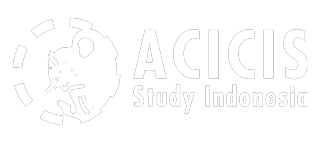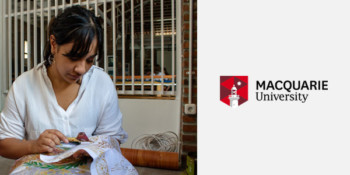Rochelle Shafazli is a 2019 New Colombo Plan Mobility Grant recipient from Macquarie University. Rochelle completed the International Relations Program at Parahyangan Catholic University, Bandung in January – June 2019.
Q: Why did you decide to undertake the ACICIS program?
I am currently studying a Bachelor of Security Studies at Macquarie University and the International Relations Program through ACICIS provided a study abroad experience that would be complimentary to my degree. With Indonesia being an important neighbour to Australia, I saw a valuable opportunity to gain a personal and immersive experience in this amazing country. Having an Indonesian parent, I also wanted to get a better understanding of where my mother had grown up. I wanted to see what getting an education in Indonesia was like compared to the one I received in Australia.
Q: Did you receive a New Colombo Plan Mobility Grant? If so, how did this contribute to your experience in Indonesia?
Yes! The New Colombo Plan Mobility Grant allowed me to live in Bandung quite comfortably. I was able to travel around easily between university and my internship at the Resilience Development Initiative. The grant allowed me to participate in interesting cultural activities in Indonesia like an Anklung show and Batik making lessons.
Q: What classes are you currently enrolled in?
- NGOs, CSOs and Empowerment: This unit looked at role of NGOs and CSOs in Indonesia and the international space. It looked at how disenfranchised communities were empowered through these organisations.
- Conflict Resolutions: This unit looked into the life cycles of intrastate conflict and the way organisations, governments and other actors play a role in these conflicts.
- Strategic Studies: The unit assessed the strategies of warfare throughout history and how these strategies apply in modern warfare
- Foreign Policy Analysis: The unit assessed different analytical frameworks and approaches to foreign policy in Indonesia and internationally
Q: Are you involved in any clubs/societies at the university?
I joined the futsal team in UNPAR. I also attended a few different training sessions.
Q: How will the International Relations Program influence your future career or study?
It feels like the International Relations Program has planted a seed for a potential career in Indonesia. Although my career plans aren’t clear as of yet, I am well set to return to Indonesia, learn the language more, and build a career in this country.
Q: How does studying International Relations from an Indonesian perspective differ to International Relations from an Australian perspective?
The Indonesian perspective of international relations is unique, especially in how nationalism, religion and ethnic diversity has framed their foreign policy in a way that sets it apart from other countries. Studying international relations in Indonesia has shown me how classic IR theory is interpreted in a different way to western governments. Furthermore, the program has shown me the similarities and differences of what these governments prioritize when conducting IR.
Q: Are you undertaking an internship while in Indonesia (brief description)?
I was undertaking an internship at the Resilience Development Initiative, a global think-tank located in Bandung where they focussed on renewable energy, marginalised communities and building a sustainable world. My contribution to RDI included providing recommendations and presentations with fellow interns on implementing a non-traditional security perspective into the think tank to expand their research and to be more connected with governments and other NGOs. We made these recommendations as we saw the Indonesian landscape to be increasingly affected by non-traditional security issues. We saw an opportunity for RDI to make the most of this kind of research. To do this, we started writing some articles and content for their website using a non-traditional security perspective. I focussed on the role of China’s ‘One Belt One Road’ Initiative in Indonesia’s renewable energy sector, and wrote another article on the role of social enterprises in increasing human security for refugee communities in Indonesia.
Q: What do you like to do in your spare time in Bandung?
In my spare time in Bandung I attended Salsa classes and social nights every week. There is a growing salsa community in Bandung and in Indonesia, I definitely recommend other students to be involved in this community. They are inclusive, open minded and very friendly people. I also did hikes every weekend with a few expats living in Bandung. Our adventures took us around Lembang and the north of Bandung.
Q: What is your favourite Indonesian food and place to eat?
My favourite Indonesian food is mie ayam. It is a nostalgic meal as it reminds me of my mum. Along Jalan Cimbuileuit there was a warung called Mie Jakarta where I would always order mie ayam with pangsit goreng, bakso goreng and es teh tawar! It was the perfect meal before, during or after uni!
Q: What is your favourite Indonesian word/phrase:
‘Ga tau ah males, mau beli truck!’
Q: What places in Indonesia have you visited during your semester so far?
I have visited Bandung, Lembang, Jakarta, Pantai Tidung, Yogyakarta and Madiun. I also travelled to see my family in other cities.


